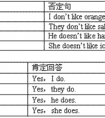用括号中动词的适当形式填空1. I _____ (not visit) Shanghai World Expo last summer.2. — ______ Nancy____ (go) to New York City last weekend? —Yes, she____ (go)-七年级英语
否定式其前加not,复合式其前加物主词,非句首宾格词也可用,尤其口语中更如此。
说明:1、主-----主语 2、宾-----宾语 3、表------表语 4、定------定语 5、谓动---谓语动词
动名词的用法:
一、动名词作主语
1. 直接位于句首做主语。例如:
Swimming is a good sport in summer.
2. 用 it 作形式主语,把动名词(真实主语)置于句尾作后置主语。
动名词做主语时,不太常用 it 作先行主语,多见于某些形容词及名词之后。例如:
It is no use telling him not to worry.
常见的能用于这种结构的形容词还有:better,wonderful,enjoyable,interesting,foolish,difficult,useless,senseless,worthwhile,等。
注意:important,essential,necessary 等形容词不能用于上述结构。
3. 用于“There be”结构中。例如:
There is no saying when he'll come.很难说他何时回来。
4. 用于布告形式的省略结构中。例如:
No smoking ( =No smoking is allowed (here) ). (禁止吸烟)
No parking. (禁止停车)
5. 动名词的复合结构作主语
当动名词有自己的逻辑主语时,常可以在前面加上一个名词或代词的所有格,构成动名词的复合结构
(这时,名词或代词的所有格做动名词的逻辑主语)。
动名词的复合结构也可以在句中作主语。例如:
Their coming to help was a great encouragement to us.
二、动名词作宾语
1.作动词的宾语
某些动词后出现非限定性动词时只能用动名词作宾语,不能用不定式。常见的此类动词有:
admit, appreciate, excuse, stand, advise, allow, permit, avoid, consider, enjoy, finish
They went on walking and never stopped talking.他们继续走,说个不停。
I found it pleasant walking along the seashore.在海滩上走真是乐事。
Mark often attempts to escape being fined whenever he breaks traffic regulations.
每当马克违反交通规则时,他常常企图逃避罚款的处分。
2.作介词的宾语
We are thinking of making a new plan for the next term. 我们正考虑为下学期制定新的计划。
Shall we have a rest or get down to doing our work? 我们休息呢还是开始干活?
3.作形容词的宾语
The music is well worth listening to more than once. 这种曲子很值得多听几遍。
We are busy preparing for the coming sports meet. 我们正为马上到来的运动会忙着做准备。
三、动名词作表语
动名词作表语时句子主语常是表示无生命的事物的名词或what引导的名词性从句。
表语、动名词与主语通常是对等的关系,表示主语的内容,主语、表语可互换位置。
Your task is cleaning the windows. 你的任务就是擦窗户。
(Cleaning the windows is your task.)
What I hate most is being laughed at. 我最痛恨的就是被别人嘲笑。
(Being laughed at is what I hate most.)
四、动名词作定语
动名词作定语往往表示被修饰词的某种用途。如:
a walking stick =a stick for walking=a stick which is used for walking
a washing machine=a machine for washing=a machine which is used for washing
a reading room=a room for reading=a room which is used for reading
a measuring tape=a tape for measuring=a tape which is used for measuring
sleeping pills=pills for sleeping=pills which is used for sleeping
动名词也有时态和语态的变化,如表所示(以及物动词write为例),不及物动词没有语态的变化。
| 时态、语态 | 主动 | 被动 |
| 一般式 | writing | being written |
| 完成式 having written |
having been written |
1) 动名词做主语时,谓语动词为单数
2) 在动名词和不定式中,作为介词的宾语是动名词
3) 动名词的否定直接在其前加否定词,通过代词的宾格或所有格形式给出逻辑主语
例:I would appreciate you calling back this afternoon.
4) 有些词后只能接动名词
acknowledge;admit; advise;advocate;allow;appreciate; avoid; celebrate; consider; contemplate; defer; delay; deny;
detest; discontinue; dislike; dispute; enjoy; it entails; escape; excuse; explain; fancy; feel like; finish; forgive; can’t help;
hinder; imagine; it involves; keep; it means; mention; mind; miss; it necessitates; pardon; postpone; practice; prevent;
recall; report; resent; resist; risk; suggest; understand...
5) 另外还有一些接-ing形式的常用说法
it’s no good; it’s no/little/hardly any/ use; it’s not/hardly/scarcely use; it’s worthwhile; spend money/time; there’s no;
there’s no point in; there’s nothing worse than; what’s the use/point
6) 有些词后面加不定式和动名词均可
remember,forget,try,stop,go on,continue,stop,regret,cease,mean后面均可用不定式和-ing形式,但意义截然不容。
例:remember to do/doing:
①I remembered to post the letters.(指未来/过去未来将要做的动作)
②I remembered posting/having posted the letters.(我记得做过这个动作)
forget与remember的用法类似。
regret的用法:
①I regret to inform you that…(我很遗憾地通知你……)
②I regretted having left the firm after twenty years.(为了“二十年前的离开”而遗憾。)
try to(努力)与try +–ing(试验):
①You really must try to overcome your shyness.
②Try practicing five hours a day.
考点名称:系动词
- 系动词:
亦称连系动词。作为系动词,它本身有词义,但不能单独用作谓语,后边必须跟表语,亦称补语(形容词),构成系表结构说明主语的状况、性质、特征等情况。 - 系动词的分类:
1)状态系动词
用来表示主语状态,只有be一词,例如:
He is a teacher. 他是一名教师。(is与补足语一起说明主语的身份。)
2)持续系动词
用来表示主语继续或保持一种状况或态度,主要有keep, rest, remain, stay, lie, stand, 例如:
He always kept silent at meeting. 他开会时总保持沉默。
This matter rests a mystery. 此事仍是一个谜。
3)表像系动词
用来表示"看起来像"这一概念,主要有seem, appear, look, 例如:
He looks tired. 他看起来很累。
He seems (to be) very sad. 他看起来很伤心。
4)感官系动词
感官系动词主要有feel, smell, sound, taste, 例如:
This kind of cloth feels very soft.
这种布手感很软。
This flower smells very sweet.
这朵花闻起来很香。
5)变化系动词
这些系动词表示主语变成什么样,变化系动词主要有become, grow, turn, fall, get, go, come, run.
例如:
He became mad after that. 自那之后,他疯了。
She grew rich within a short time. 她没多长时间就富了。
6)终止系动词
表示主语已终止动作,主要有prove, turn out, 表达"证实","变成"之意,例如:
The rumor proved false. 这谣言证实有假。
The search proved difficult. 搜查证实很难。
His plan turned out a success. 他的计划终于成功了。(turn out表终止性结果) 系动词使用的注意事项:
系动词本身有一定的词义,不能单独作谓语,后面必须与表语连用。复习系动词时,必须注意以下几个问题:<?xml:namespace prefix = "o" ns = "urn:schemas-microsoft-com:office:office" />1.be是最重要的系动词,主语不同,be的形式也不同,且有时态的变化。
a通常表示主语的特征、状态和身份等,后面接形容词、副词、名词、介词短语、不定式、v-ing、过去分词及表语从句作表语。
- 最新内容
- 相关内容
- 网友推荐
- 图文推荐
| [家长教育] 孩子为什么会和父母感情疏离? (2019-07-14) |
| [教师分享] 给远方姐姐的一封信 (2018-11-07) |
| [教师分享] 伸缩门 (2018-11-07) |
| [教师分享] 回家乡 (2018-11-07) |
| [教师分享] 是风味也是人间 (2018-11-07) |
| [教师分享] 一句格言的启示 (2018-11-07) |
| [教师分享] 无规矩不成方圆 (2018-11-07) |
| [教师分享] 第十届全国教育名家论坛有感(二) (2018-11-07) |
| [教师分享] 贪玩的小狗 (2018-11-07) |
| [教师分享] 未命名文章 (2018-11-07) |

![Which of the following can you probably see in the meeting room? [ ]A. B. C.D. -七年级英语](http://www.00-edu.com/d/file/ks/4/2/dongmingci/2020-01-08/small97361980a56115e1c9237567439904fe1578422951.jpg)

![—Can the boy finish_____ the book in about a week? —I think he can. [ ]A. read B. reading C. to read D. reads -八年级英语](http://www.00-edu.com/d/file/ks/4/2/dongmingci/2020-01-08/smallfa4d713075e249356362fe7392193a301578421751.png)


